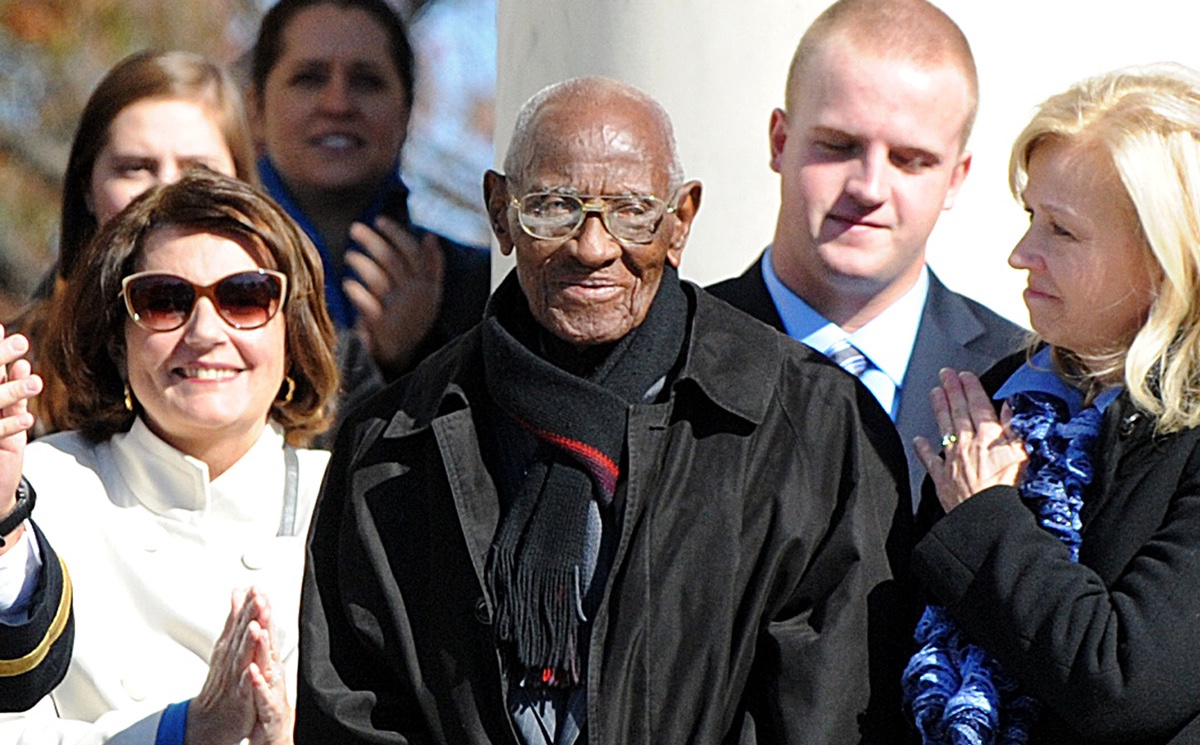Thanking 'Cigars and God,' Oldest US Vet Turns 111

Get the world’s most fascinating discoveries delivered straight to your inbox.
You are now subscribed
Your newsletter sign-up was successful
Want to add more newsletters?

Delivered Daily
Daily Newsletter
Sign up for the latest discoveries, groundbreaking research and fascinating breakthroughs that impact you and the wider world direct to your inbox.

Once a week
Life's Little Mysteries
Feed your curiosity with an exclusive mystery every week, solved with science and delivered direct to your inbox before it's seen anywhere else.

Once a week
How It Works
Sign up to our free science & technology newsletter for your weekly fix of fascinating articles, quick quizzes, amazing images, and more

Delivered daily
Space.com Newsletter
Breaking space news, the latest updates on rocket launches, skywatching events and more!

Once a month
Watch This Space
Sign up to our monthly entertainment newsletter to keep up with all our coverage of the latest sci-fi and space movies, tv shows, games and books.

Once a week
Night Sky This Week
Discover this week's must-see night sky events, moon phases, and stunning astrophotos. Sign up for our skywatching newsletter and explore the universe with us!
Join the club
Get full access to premium articles, exclusive features and a growing list of member rewards.
The oldest verified surviving U.S. war veteran, Richard Overton, turned 111 years old yesterday (May 11), and he credits cigars and God for his supercentenarian life.
A GoFundMe page, set up on Dec. 26, 2016, has raised $179,328 of its $200,000 goal to fund Overton's 24/7 care at his home in Austin, Texas.
His secret? "Cigars and God," according to the description on his GoFundMe page.
"I've been smoking cigars from when I was 18 years old. I'm still smoking them. Twelve a day! Doctors say, 'Don't smoke those cigars, don't eat no salt.' He took me off of salt 40 years ago. And I eat salt whenever I get ready," Overton said in 2014, according to the local Austin Fox News station.
The oldest person to ever live (who's age was verified), was Jeanne Louise Calment of France, who was 122 years and 164 days when she died on Aug. 4, 1997, according to Guinness World Records. The current record holder for the title of oldest living man is 113-year-old Holocaust survivor Israel Kristal of Israel, who was born on Sept. 15, 1903, according to Guinness.
As of April 2017, Guinness had yet to verify the new title holder for the current oldest living person. Emma Martina Luigia Morano of Vercelli, Italy, had been confirmed by Guinness as the oldest living person in the world in 2016. She died in April 2017 at the age of 117.
"Guinness World Records is consulting with our expert gerontologists and will verify the new title holder, subject to evidence review, in due course," said a Guinness spokesperson in a statement in April.
Get the world’s most fascinating discoveries delivered straight to your inbox.
These record holders have given various reasons for their longevity. In 2015, the world's oldest person at the time, 116-year-old Gertrude Weaver, said the keys were exercise and kindness. Misao Okawa, who had been crowned the world's oldest person in 2013, when she was 114 years old, attributed her long life to "eating delicious things," such as ramen noodles, beef stew, hashed beef and rice, Live Science previously reported.
Though scientists haven't found any fountain of youth, plenty of research has investigated the keys to longevity and common elements of centenarians.
Researchers who followed 477 Ashkenazi Jews between the ages of 95 and 112 found that these very old individuals did not have superhealthy lifestyles, with their profiles nearly matching those of the general public in terms of the number who were overweight, didn't exercise or smoked, the scientists said. The researchers' conclusion? Genes play an important role in whether a person lives to see 100, the scientists reported in 2011 in the Journal of the American Geriatrics Society.
A study published Dec. 17, 2015, in the journal PLOS Genetics, revealed four genes linked to longevity: ABO, a gene that helps determine blood type; CDKN2B, which regulates cell division; APOE, a gene linked to Alzheimer's disease; and a gene labeled SH2B3.
Of course, genes do not act alone, and a healthy lifestyle can also contribute to a long life. For instance, researchers found that centenarians living in Sicily's mountain villages ate a Mediterranean diet that was rich in fruits, vegetables and whole grains, and low in red meat and sweets, Live Science previously reported.
Original article on Live Science.
Jeanna Bryner is managing editor of Scientific American. Previously she was editor in chief of Live Science and, prior to that, an editor at Scholastic's Science World magazine. Bryner has an English degree from Salisbury University, a master's degree in biogeochemistry and environmental sciences from the University of Maryland and a graduate science journalism degree from New York University. She has worked as a biologist in Florida, where she monitored wetlands and did field surveys for endangered species, including the gorgeous Florida Scrub Jay. She also received an ocean sciences journalism fellowship from the Woods Hole Oceanographic Institution. She is a firm believer that science is for everyone and that just about everything can be viewed through the lens of science.
 Live Science Plus
Live Science Plus










